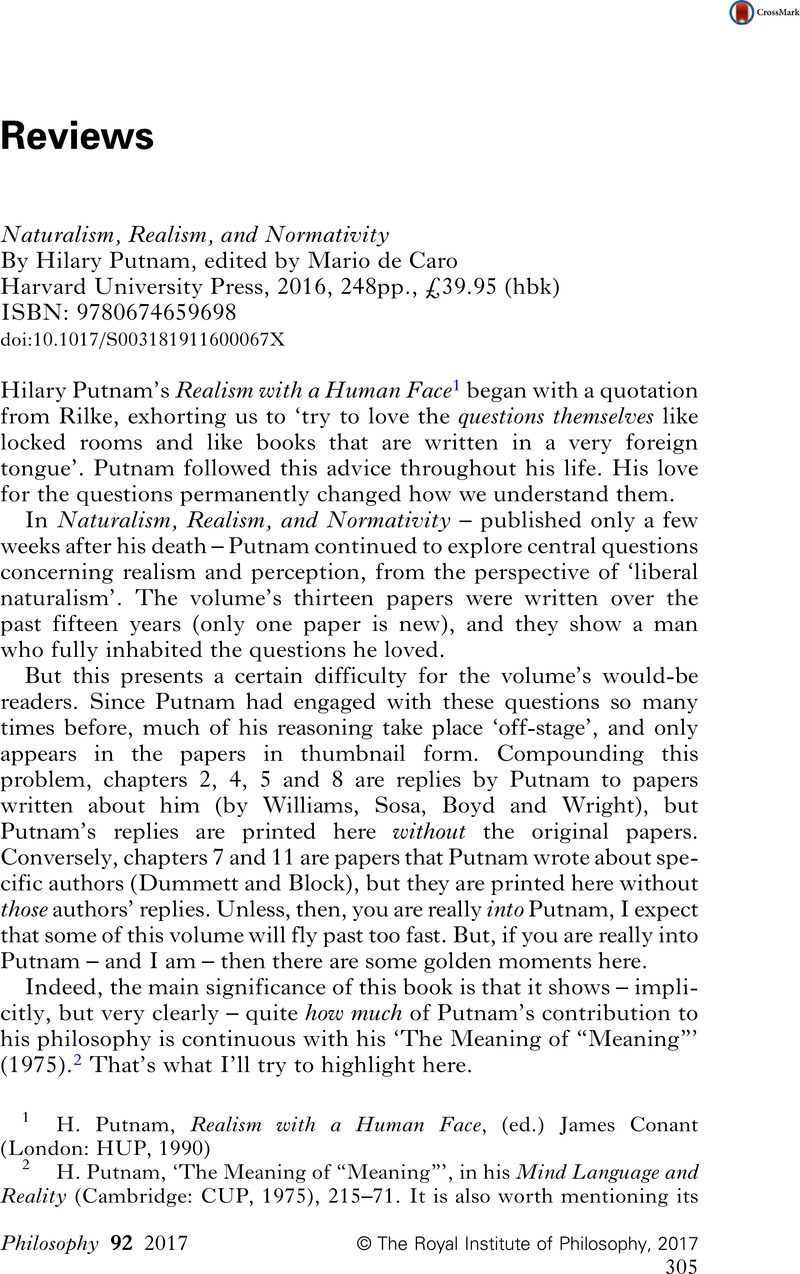No CrossRef data available.
Published online by Cambridge University Press: 24 January 2017

1 Putnam, H., Realism with a Human Face, (ed.) Conant, James (London: HUP, 1990)Google Scholar
2 Putnam, H., ‘The Meaning of “Meaning”’, in his Mind Language and Reality (Cambridge: CUP, 1975), 215–71CrossRefGoogle Scholar. It is also worth mentioning its predecessor: ‘Meaning and Reference’, The Journal of Philosophy 70(19) (1973), 699–711 CrossRefGoogle Scholar.
3 See also his ‘Replies’, Philosophical Topics, 20(1) (1992), 349 Google Scholar, 358
4 H. Putnam, ‘Meaning and Reference’ (1973), 704; ‘The Meaning of “Meaning”’ (1975), 227.
5 See Button, T., The Limits of Realism (Oxford: OUP, 2013)CrossRefGoogle Scholar, 183ff.
6 Cf. Putnam, ‘The Meaning of “Meaning”’ (1975), 235 and my The Limits of Realism, (2013), 182–3.
7 See also ‘The Meaning of “Meaning”’ (1975), 220.
8 Putnam, H., Reason, Truth, and History (Cambridge: CUP, 1981), 18–19 CrossRefGoogle Scholar, 22–5.
9 H. Putnam, Reason, Truth, and History (1981), ch.1; H. Putnam, ‘Replies’, (1992), 369. See also my Limits of Realism (2013), 118.
10 McDowell, J., ‘Putnam on Mind and Meaning’, Philosophical Topics 20(1) (1992), 347–408 CrossRefGoogle Scholar.
11 See also H. Putnam, ‘Replies’ (1992), 356–7, 368–61.
12 Or maybe brains + central nervous systems; but it's easier just to speak of brains, and won't change any of the points I want to make.
13 Putnam, H., Representation and Reality (Cambridge MA: MIT Press, 1988), 73–5Google Scholar.
14 But this retelling of Putnam's intellectual history smooths over one interesting wrinkle: Putnam had anticipated aspects of this liberal functionalism in Representation and Reality (1988, 75ff), but nevertheless rejected functionalism (tout court) for further reasons.
15 McDowell, J., Mind and World (Cambridge, MA: HUP, 1994)Google Scholar
16 See e.g. H. Putnam, ‘Replies’ (1992), 361
17 Cf. T. Button, Limits of Realism (2013), 84–6.
18 Indeed, he was working on a book with Hilla Jacobson (and mentions this on page 158); Jacobson intends to finish and publish the book.
19 Field, H., ‘Tarski's Theory of Truth’, The Journal of Philosophy 69(13) (1972), 347–75CrossRefGoogle Scholar.
20 See also Realism with a Human Face (1990), 291–5.
21 H. Putnam, Reason, Truth, and History (1981), 46–8; Realism with a Human Face (1990), 37–8, 80–95; Renewing Philosophy (Cambridge, MA: HUP, 1992), 35–59.
22 Putnam, H., ‘Realism and Reason’, Proceedings and Addresses of the American Philosophical Association, 50(6) (1977), 483–98CrossRefGoogle Scholar, especially pages 488, 495; Reason, Truth, and History (1981), 53–4.
23 Putnam, H., ‘Das Modelltheoretische Argument und die Suche nach dem Realismus des Common sense’, in Willaschek (ed.), Realismus (Paderbon: Ferdinand Schöningh Verlag, 2000), 125–42Google Scholar.
24 ‘hilary, n. (from hilary term) A very brief but significant period in the intellectual career of a distinguished philosopher. “Oh that's what I thought three or four hilaries ago.”’ From The Philosophical Lexicon, http://www.philosophicallexicon.com/
25 H. Putnam, ‘The Meaning of “Meaning”’, (1975), 222.
26 H. Putnam, ‘Realism and Reason’ (1977), 484.
27 Putnam, H., ‘Does the Disquotational Theory of Truth Solve All Philosophical Problems?’ Metaphilosophy 22(1) (1991), 1–13 CrossRefGoogle Scholar.
28 Acknowledgements. I wrote this paper during a period of research leave which was funded by a Philip Leverhulme Prize (awarded by the Leverhulme Trust, PLP–2014–140). Thanks to Maria Baghramian, Ned Block, Hilla Jacobson, Rob Trueman, and (most especially) Ori Beck.